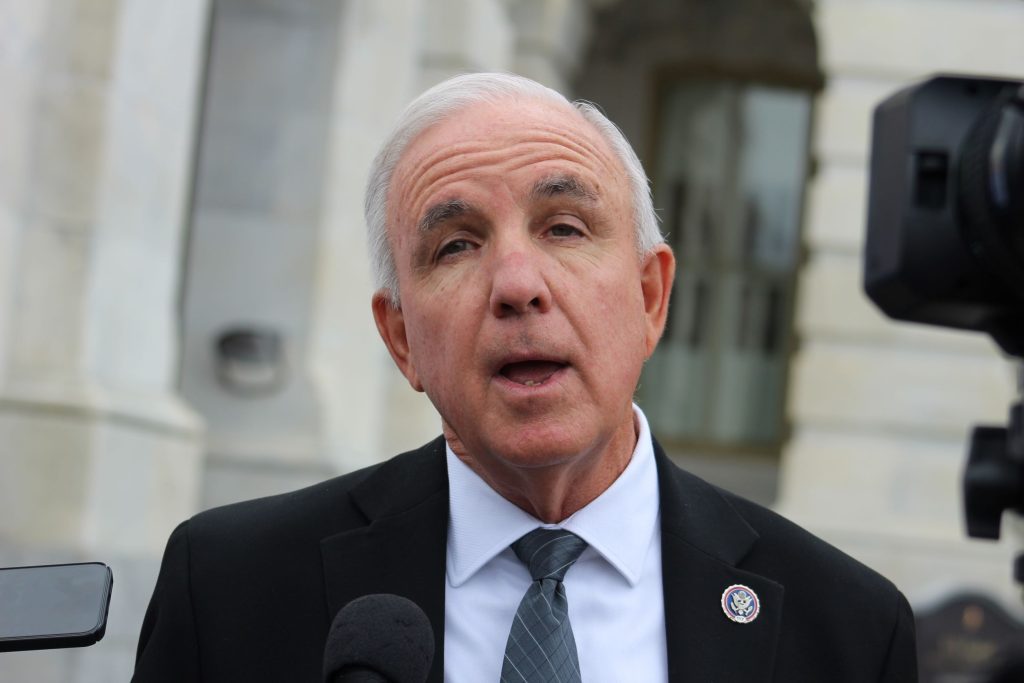Jordan Loses First Vote in Bid to Become Speaker

WASHINGTON — Rep. Jim Jordan, R-Ohio, the combative co-founder of the far-right House Freedom Caucus, failed to garner the 217 votes he needed to become the next House speaker Tuesday, after 20 members of his conference broke ranks and voted against him.
Though the outcome of the first round of balloting on the House floor was widely expected, the number of Republican holdouts — 20 in all — was larger than expected when the House was called to order shortly after noon on Tuesday.
They include Rep. Kay Granger, R-Texas, and other members of the House Appropriations Committee, a contingent from New York who are still smarting over Jordan’s votes against Hurricane Sandy aid and other bills important to the northeast, and other conference members who see the ouster of former Speaker Kevin McCarthy, R-Calif., as nothing short of a coup.
Heading into the vote, Rep. Ralph Norman, R-S.C., told The Well News he believed it would take three votes to elect Jordan speaker, while Rep. Nicole Malliotakis, R-N.Y., said she thought it could be quite a bit longer.
“I think it’s going to take somewhere between the five ballots it took for Pope Francis to become pope, and the 15 ballots it took to elect Rep. [Kevin] McCarthy, R-Calif., speaker last January,” she said.
When the voting ended Tuesday afternoon, Jordan had 200 votes, all from Republican members, while House Minority Leader Hakeem Jefferies, D-N.Y., had 212 votes, all of them from Democrats.
Seven Republicans voted for House Majority Leader Steve Scalise, R-La., while six voted for McCarthy.
Rep. Lee Zeldin, R-N.Y., received three votes from the angry New York contingent of Republicans, while Reps. Tom Emmer, R-Minn., the current House majority whip, Mike Garcia, R-Calif., Tom Massie, R-Ky., and Tom Cole, R-Okla., each got one vote.
Jordan, an unapologetic ally of former President Donald Trump, had gone into the vote saying he was willing to have multiple rounds play out Tuesday.
“Whatever it takes to get a speaker today,” he told reporters.
But once the outcome of the first round of voting was known, the Republicans immediately called a recess, presumably to give them time to find a way forward and to pressure the dissenters into falling in line.
Speaking to reporters on the steps of the Capitol as they filed out and headed back to their offices, several Republican members said they hoped to return and try again Tuesday night.
Others said a second roll call vote was more likely to happen Wednesday.
As it stands now, the House continues to effectively be frozen in its tracks, unable to pass legislation or carry out any other business until a new leader is picked.
High among the concerns of those in the chamber is the fact it might not be able to provide aid and support to Israel as it wages war against Hamas.
Rep. Elise Stefanik, R-N.Y., who formally nominated Jordan ahead of Tuesday’s vote, praised what some criticize as his pugnacious, take-no-prisoners style, as a sign that he is “strategic, scrappy, tough and principled.”
But several Democrats took an entirely different view, including Rep. Pete Aguilar, D-Calif., who was almost incendiary in remarks excoriating Jordan for supporting Trump and his insurrectionist loyalists who laid siege to the U.S. Capitol on Jan. 6, 2021.
Aguilar went so far as to accuse Jordan of “inciting violence” against the chamber, and a number of other Democrats similarly rebuked the Republican speaker nominee as they rose to vote against him.
“Let’s be clear,” Aguilar said. “A vote for the gentleman from Ohio is a vote to turn your back on national security. It’s a vote to turn your back on a bipartisan path to fund the government and avoid shutdowns.”
Later, Rep. James Clyburn, D-S.C., said the result of the day’s vote was what he had expected when he arrived on the Hill this morning.
“I’m hopeful that we can really come together and find a bipartisan path out of this,” Clyburn said. “And the opportunity is there. Hakeem Jeffries has made it very clear that he’s all for finding a bipartisan resolution to this and I think the American people deserve that.
“We’re not crazy. We understand that if you are in the majority, then you get an opportunity to have the speaker of your choice and nobody is asking them to depart from that,” he said.
However, when asked what a Jordan speakership would mean for the country, Clyburn was blunt.
“It would mean that the country is going backwards, rather than continuing on the march we’ve been on toward a more perfect union,” he said.
Rep. Steny Hoyer, D-Md., the former House majority leader, said he hoped some conversations were taking place behind closed doors to reach a bipartisan resolution to what’s now become a speaker impasse, but that he wasn’t privy to any first-hand knowledge.
“What we have now is a situation where the House has been shut down for weeks by the extreme wing of the Republican Party. This is our first day of meeting [since they ousted Speaker McCarthy], so we’ll see where it goes,” Hoyer said.
“The one thing [that] is clear is that what’s going on now needs to stop and the way it stops is for Republicans to decide that they need to move to a place where they can pick up votes as opposed to losing them.”
Rep. Carlos A. Gimenez, R-Fla., one of the members who voted for McCarthy on Tuesday, said he did so because he would not support a “coup” within his own party, and he vowed not to change his vote in favor of Jordan.
But Rep. Bob Good, R-Va., one of those who played a key role in dragging out the McCarthy vote in January, was unrepentant and predicted Jordan will prevail regardless of his naysayers.
“Last January we were voting against a very unpopular Republican leader and the grassroots base of Republican constituents overwhelmingly did not want us to vote for Speaker McCarthy, and frankly, what the base is telling us now is the total opposite of that — they want us to vote for a speaker and they want that speaker to be Jim Jordan,” he said.
Dan can be reached at [email protected] and @DanMcCue










































